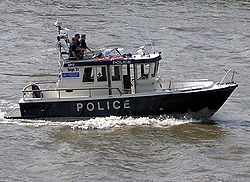- Metropolitan Police Marine Policing Unit
-
The Marine Policing Unit (MPU) (previously named Thames Division, then Marine Support Unit) is a Central Operations branch of London's Metropolitan Police Service.
Contents
Role
The unit is responsible for waterborne policing of the River Thames in London. Based at Wapping police station and having 22 vessels at its disposal, the unit also provides support to the rest of the Metropolitan Police Service and the City of London Police when dealing with incidents in or around any waterway in London. A specialist Underwater and Confined Spaces Search Team carries out specialist searches throughout the Metropolitan Police District. The unit also has 24 Officers who are trained in Rope Access techniques and are trained to carry out searches and counter demonstrator operations at height.
History
Thames Division was formed in 1839 when the Marine Police Force was absorbed into the Metropolitan Police Force. The original marine force is considered the first preventive police in the history of policing in England. It began when a merchant and magistrate, Patrick Colquhoun, teamed up with mariner John Harriott and Jeremy Bentham to persuade shipping companies to finance a police force to stop the theft of cargo from the docks. The first death in the line of duty occurred shortly thereafter, when Gabriel Franks was killed in a skirmish with dock workers protesting against the new force.[1] Impressed by the economic impact of the initiative, the government passed the Marine Police Bill on 28 July 1800, making it one of the first publicly funded police force.[2]
Initially patrols were conducted in rowing boats, some of which remained in use until 1905. Impetus to change was provided when, on 3 September 1878 the steam collier Bywell Castle ran into the pleasure steamer Princess Alice in Galleons Reach with the loss of over 600 lives. The subsequent inquest and inquiry recommended that Thames Division should have steam launches, as rowing galleys had shown themselves to be inadequate for police duty, and the first two were commissioned in the mid 1880s. In 1910 the first motor vessels were introduced.[3].
On 20 August 1989 the Marchioness disaster occurred when the aggregate dredger Bowbelle collided with the passenger vessel Marchioness near Cannon Street Railway Bridge. Four MSU patrol boats assisted in the rescue of 87 people. 51 people died and following subsequent inquiries, the Government asked the Maritime and Coastguard Agency, the Port of London Authority and the Royal National Lifeboat Institution (RNLI) to work together to set up a dedicated Search and Rescue service for the tidal River Thames. Consequently, on the 2 January 2002, the RNLI set up four lifeboat stations at Gravesend, Tower Pier, Chiswick Pier and Teddington taking over the role of primary search and rescue service on the Thames from the MSU.
In 2001, Thames Division was renamed the Marine Support Unit, and again in 2008 to the Marine Policing Unit. It is responsible for the 14 miles of the River, lying between Hampton Court and Dartford Creek. Above Hampton court, Surrey Police have responsibility for policing, but a launch is supplied by the Environment Agency. Below Dartford Creek, responsibility lies with the Essex Police and Kent Police. Kent and Essex Police have combined forces and formed the joint marine unit. Kent Police based in Sheerness and Essex Police based in Burnham on Crouch.
References
- ^ Dick Paterson, "Thames Police History - The Police Establishment," Thames Police Museum. Retrieved 7 February 2007.
- ^ Dick Paterson, "Thames Police History - Government Sponsorship," Thames Police Museum. Retrieved 7 February 2007.
- ^ History of the Marine Support Unit accessed 7 Feb 2007
External links
Central Operations Emergency Preparedness OCU · Operational Support Unit (Air Support Unit · Dog Support Unit · Marine Policing Unit · Mounted Branch) · Public Order OCU · Specialist Firearms Command · Traffic OCU · Traffic Criminal Justice Unit · Territorial Support Group
Specialist Crime
DirectorateCovert Policing · Economic and Specialist Crime · Forensic Services · Homicide and Serious Crime Command (Murder Investigation Teams) · Human Exploitation and Organised Crime Command · Operations Trident and Trafalgar · Serious and Organised Crime Group (Flying Squad)Specialist Operations Territorial Policing Commissioner of Police of the Metropolis · History · Metropolitan Police Authority · Metropolitan Police District · Metropolitan Police F.C. · Metropolitan Special Constabulary · New Scotland Yard · Organisation and structure · The Job Categories:- Metropolitan Police units
- Transport on the River Thames
- Crime in London
- Port of London
- Port police forces of the United Kingdom
Wikimedia Foundation. 2010.

